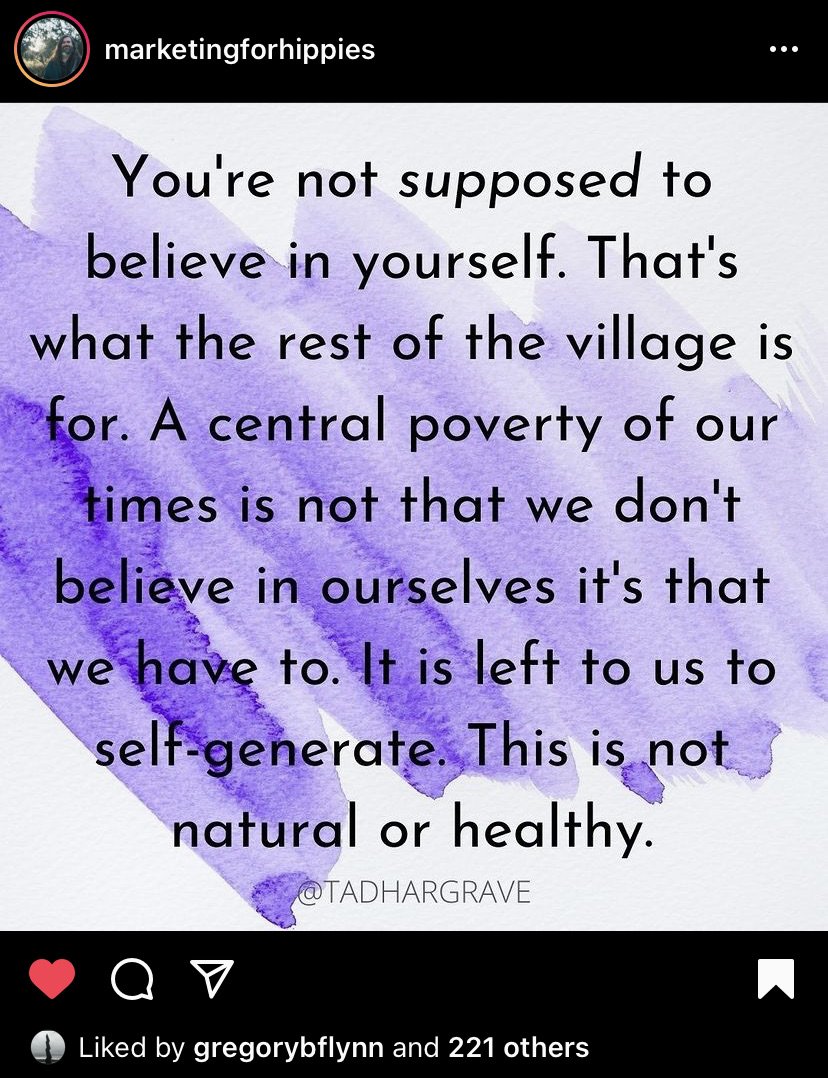The Self…and the village
I've been sitting with the message in this Instagram post for about a week. When it landed in my feed it landed in my body. Hard. As someone who has struggled with self-worth for most of his life, I could feel in my nervous system the truth of these words.
But it's not the story we were given, was it? I don't know about you, but in the world I was raised in, the ideas of self-acceptance, self-esteem, self-love are plastered all over the place. There are bookshelves at bookstores lined with tomes that claim they will help you find yourself, help you accept yourself, help you make something of yourself. I probably have three or four bookshelves of this sort here in my home. Perhaps you've got a similar book or two.
And yet, even when I was reading those books, it bothered me. There was always this sense that something wasn't quite right. That I was looking for something that wasn't fully possible.
We don't live in a village anymore, do we? We don't (generally[^2]) have the kind of community that this quote points to. Somewhere in his book, The Wild Edge of Sorrow, Francis Weller says something to the effect of, "We come into the world wired to be greeted, day-in and day-out, by forty or fifty eyes. If we are lucky today, we get four." His point is that our nervous systems are designed to be raised and regulated by a community -- by a village -- not by a nuclear family that is isolated from the influence of a larger whole.
There's a lot of directions that we can go from here. The dissolution of our modern society. The challenge of being raised in the world today, and the long term impacts it has on the qualities of our lives. The ways that we are seperated from one another. Each of these feels like they could be a book, let alone a blog post.
What I want to mention here is simply the need for community. This has become harder and harder to find in so many ways. Charles Eisenstein talks about how the ability we have to buy literally anything these days has made it so we don't need one another any more, so the social needs dissolve. I think there's a lot of truth in that.
Then there is those of us conditioned as men. I believe this is even harder for men. Our conditioning has made it such that the act of reaching for others, for asking for help, for asking for support, for saying "I don't know," or, even harder, "I'm scared" is remarkably disruptive. It may even be revolutionary.
Which comes first? The social norm of isolating into a world without a village where we need to find our selves? The male patterning of withdrawal, do-it-yourself, rugged individual? I'm not sure (though I have my theories). I don't know that it matters.
In a lot of ways, it's too late to get what Tad is talking about above. Most of us have been on one self-fulfilmment quest or another for much of our lives. What's possible, however, is to start creating new patterns. To open ourselves to new ways of doing things. To creating new relationships.
My teachers, mentors, and friends at Holistic Resistance (HR) have modeled this for me so profoundly. When I first met Aaron Johnson, HR's co-founder, he suggested that we spend ten years unpacking a question together. He wasn't kidding. The four of them at HR talk about the 'life-long reach'. And they mean it.
This is what I'm talking about. It's revolutionary in every just about every circle we can imagine to consider committing ourselves to patterns of community that extend out into the vastness of 'life-long'. Yet, I bet, if you feel deep enough into your body, some part of you relaxes. Some part of you feels what that kind of holding can be like.
What does it mean to create a space in which we can be held in community? By a village?
What would it mean to find out?
[^1]: You can read a blog post Tad wrote about this piece, which is really good, here.
[^2]: Yes, I know that there are folks who do indeed live in villages and community like what I'm talking about here. But we all know that's the rarity these days.

